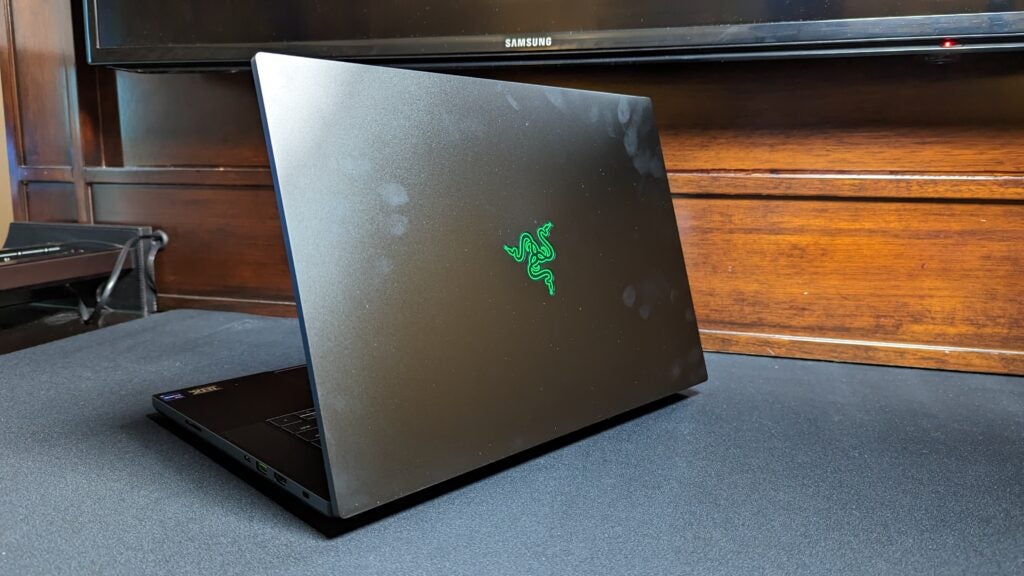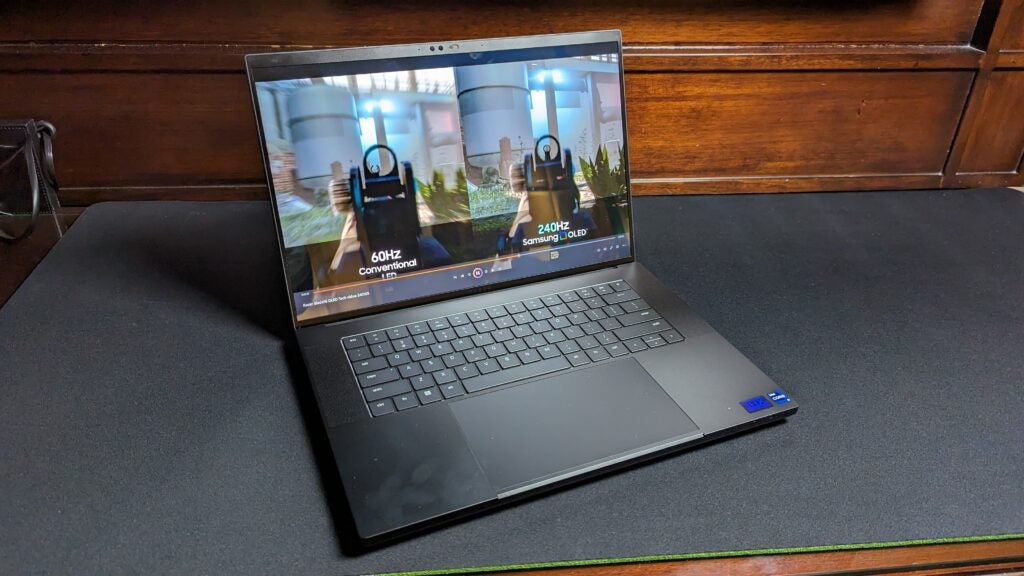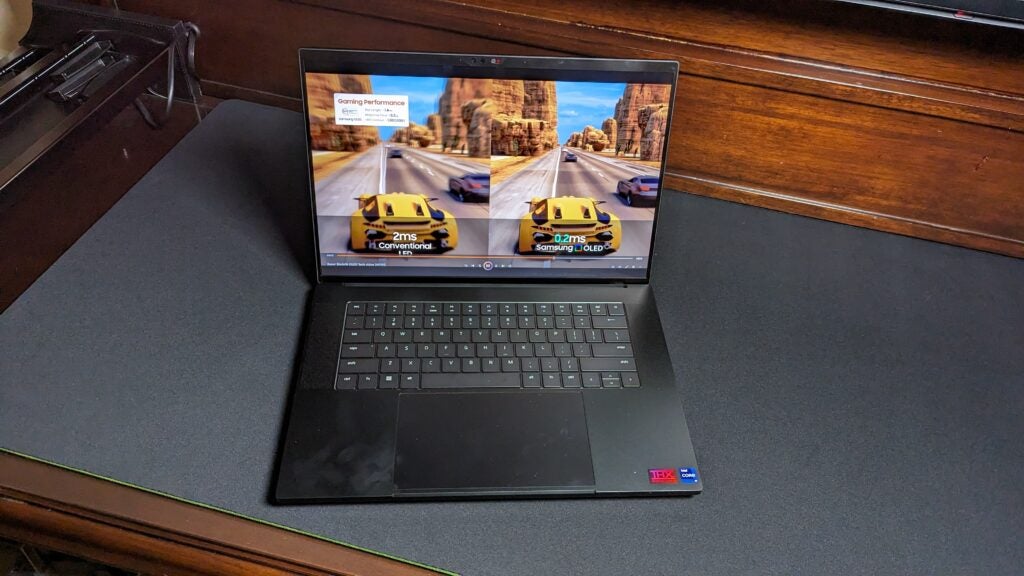First Impressions
The Razer Blade 16 (2024) packs a couple of great upgrades, including the new 240Hz OLED screen for dazzling contrast, and the cutting-edge 14th Gen Intel chips. It’s not a huge leap forward then, but the comprehensive spec sheet still puts the Blade in a strong position as one of the leading gaming laptop options of the year.
Introduction
When a new generation of gaming laptops arrive, the Razer Blade series is one of the first I look to, as they’re typically packed to the brim with bleeding-edge technology.
It’s no surprise, then, to see the new Razer Blade 16 (2024) become the world’s first laptop to feature a 16-inch OLED display with a zippity 240Hz refresh rate. With Razer previously using Mini LED panels, it’s finally made the move over to OLED for improved contrast and deep inky blacks.
Razer has also fitted the Blade 16 with the new 14th Generation Intel Core HX processors. There’s sadly no graphics upgrade compared to the Razer Blade 16 (2023), but support up to an Nvidia RTX 4090 GPU ensures there’s still plenty of firepower here.
The Razer Blade 16 (2024) has a mouth-watering spec sheet then, but can it live up to the hype? I went hands-on with the new laptop at CES 2024 to find out.
Availability and price
The Razer Blade 16 (2024) has a starting price of £3099.99/$2999.99/€3499.99, and is available to buy right now.
Design
- Same classy metal design as before
- New 240Hz OLED option
- Mini LED is still available if you prefer
The Razer Blade 16 design feels timeless, with the new 2024 model unchanged compared to its predecessor, yet still looks modern and stylish enough to outclass the vast majority of the competition.
It flaunts an anodised aluminium chassis, making it one of the best designed gaming laptops on the market, drawing comparisons to Apple’s MacBook in terms of build quality. It’s still a fingerprint magnet though, with numerous smudges becoming visible in the short time I spent with the new Blade 16.

Razer claims the Blade 16 still offers the most graphics power per cubic inch, with a slim design considering the specs. I certainly wouldn’t call it lightweight though, coming in at 2.45kg. I was still easily able to lift the laptop and carry it around the room, but I certainly wouldn’t want to be lugging in a rucksack on the regular.
While the design hasn’t been tweaked, Razer has added in a new OLED panel which is the headline upgrade of the 2024 edition. Most people already know the benefits of OLED at this point, but the upgrade is really hammered home when you place this laptop next to the LCD Blade 14.
Thanks to the improved contrast of OLED, bright colours look like they’re glowing on the screen, while the same colours on an LCD screen look dulled by comparison. Blacks on an OLED display look inky dark too, while on an LCD they appear more greyish instead.

Is OLED better than the Mini LED panel of the previous Razer Blade models? It really comes down to preference with Mini LED able to hit a higher brightness (1000 nits compared to 400 nits), but the OLED is still capable of a greater overall contrast and achieves a slightly faster response time at 0.2 milliseconds.
Razer will still be offering a Mini LED option for those who prefer it, with both screen options supporting a 240Hz refresh rate, Quad HD+ resolution and Nvidia G-Sync technology.
Specs and Performance
- Powered by the latest Intel HX chips
- No graphics upgrade for 2024
- Up to 96GB RAM and 8TB SSD
The Razer Blade 16 (2024) is powered by the brand new 14th Gen Intel Core i9-14900HX processor, which was only just announced this week at CES 2024. The chip is made up of 24 cores and 32 threads, with the capability of 5.8GHz boost speed.
I haven’t been able to test this processor just yet, but it looks like a monster, with Intel calling it the world’s fastest mobile processor currently available.

There’s been no graphics upgrade this time around – because Nvidia hasn’t launched any new laptop GPUs – but I doubt anyone is craving more power than what the current RTX 4070, RTX 4080 and RTX 4090 GPUs currently offer.
Memory options range from 16GB and 96GB, while the storage options top out at a remarkable 8TB SSD. It will be difficult to find a gaming laptop to better specs than these.
Early Verdict
The Razer Blade 16 (2024) is an impressive gaming laptop, although not a huge amount has changed from last year. The OLED screen is certainly the best upgrade, as Razer is finally able to marry the top-notch visuals with the high performance expected from a Blade laptop.
The new 14th Generation Intel Core HX processor will likely provide a big boost to the processing power too, although it’s a shame that there’s no graphics boost this time around, although that’s hardly Razer’s fault since no new GPU options have been provided by Nvidia.
Otherwise, Razer is opting for consistency for the rest of the design and features. I personally don’t think that’s an issue, with the Razer Blade 16 already proving to be class act. Whether it’s still worth the steep $3000 base price is another question, one that we will be answering when we get our hands on a review sample.

























